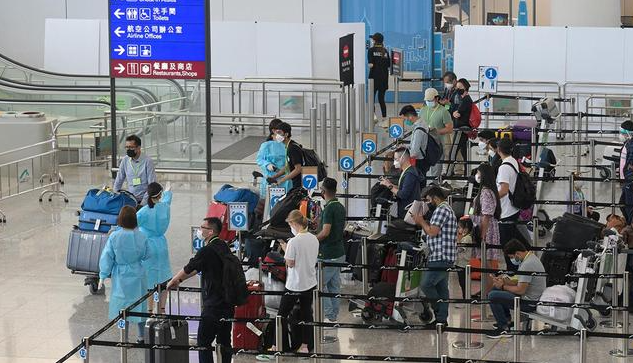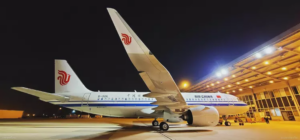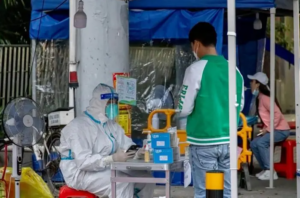
Into China centralized isolation canceled, international airline ticket searches rose 8.5 times! Many countries check nucleic acid on travelers from China
In the evening of December 26, the National Health Commission issued a general plan for the implementation of the “Class B B control” of novel coronavirus infection, which optimizes the management of the movement of Chinese and foreign personnel and eliminates full nucleic acid testing and centralized isolation after entry.
After the release of the news, the instantaneous search volume of international air tickets on several platforms increased exponentially, and many industry insiders expected that the international air ticket prices, which are still at a high level, would gradually decrease.
However, at the same time that China is removing controls on inbound personnel, some countries are beginning to increase their nucleic acid testing requirements for travelers from China.
No centralized quarantine required for entry into China
According to the arrangement, from January 8, 2023, “Category B control” will be implemented for novel coronavirus infection. According to the Prevention and Control of Infectious Diseases Act, no more quarantine measures will be implemented for people infected with the new coronavirus and no more close contacts will be identified; no more high- and low-risk areas will be designated; the classification and treatment of people infected with the new coronavirus will be implemented and the medical security policy will be adjusted at the appropriate time; the testing strategy will be adjusted to “testing as much as possible”; and the frequency and content of information release on the epidemic will be adjusted. According to the Law on Health and Quarantine of the State Border, no longer take quarantine infectious disease management measures for incoming persons and goods.
Among the main measures, Article 12 specifies that the nucleic acid test will be conducted 48 hours before the trip, and those with negative results can come to China without applying for a health code from our embassies and consulates abroad and filling in the results in the customs health declaration card. If the result is positive, the person concerned should come back to China after the result has turned negative. Eliminate full nucleic acid testing and centralized quarantine upon entry. If the health declaration is normal and there is no abnormality in the routine quarantine at the customs port, the person can be released to enter the social side. Eliminate the “Five-One” and seat-rate restrictions on the number of international passenger flights. All airline companies will continue to do a good job of in-flight epidemic prevention, and passengers must wear masks when flying. Further optimize the arrangements for foreigners coming to China for resumption of work and production, business, study, family visits and reunion, and provide corresponding visa convenience. Gradually resume the entry and exit of passengers at waterways and land ports. Resume Chinese citizens’ outbound travel in an orderly manner according to the international epidemic situation and the capacity of all services to guarantee.
At present, China is still implementing the “5+3” quarantine measures for inbound persons, i.e. five days of centralized quarantine + three days of home quarantine. The latest plan of the Health and Welfare Commission means that from January 8, the centralized quarantine is no longer needed after entering China.
Data from the same travel platform shows that after the news was released, the instantaneous search volume of international air tickets across the platform increased by 850%; the instantaneous search volume of visas increased by 10 times. The top three overseas destinations that Chinese tourists are most concerned about are: Japan, South Korea and Thailand. The main search users for outbound travel are from Beijing, Shanghai and Guangzhou.
According to the data of GoWhere platform, within 15 minutes after the news was released, the instantaneous search volume of international air tickets increased 7 times, and the popular destinations were Thailand, Japan and South Korea.
International air ticket prices are expected to gradually reduce
At the same time, it is also clear in the program that the number of international passenger flights such as “five-one” and seat rate restrictions will be cancelled, which means that international flights that were previously restricted will also continue to increase.
According to the Civil Aviation Operation Briefing for Week 51 of 2022 released by Flight Manager, during the week of 12.19-12.25, the number of flights on international routes was 1,065, down 1.3% from last week, up 77.8% from 2021 and down 93.2% from 2019.
Lan Xiang, the president of the Where to Go Big Data Research Institute, analyzed that the adjustment of the immigration policy is conducive to promoting the orderly recovery of international flights, and the volume of inbound and outbound passengers will pick up in the short term. And with the gradual normalization of the supply and demand relationship between entry and exit tickets, it will drive the overall price of international air tickets to gradually reduce.
Where to go platform data show that since December, the international hotel booking volume also gradually higher. This, cross-border policy is relatively friendly Macau, Hong Kong, and overseas countries with visa-on-arrival, visa-free, is the primary choice of domestic travelers. From the data, where to go on the platform of Macau hotel reservations than in early December rose 2 times, overseas areas of the Philippines, France, Thailand hotel reservations increased by more than 1 times, the Philippines increased by more than 1 times, want to go abroad to explore the world of travelers gradually increased.
Lan Xiang analysis, relative to the average price before the epidemic, the current international air ticket prices are still at a high level, and the overall international flights still need some time to recover to the normal level. Japan, South Korea, Southeast Asia and other routes with a large number of flights, airfares may rise. With the policy in place and the recovery of the operating capacity of the airline company, the summer of 2023 may usher in the peak of entry and exit.
Civil aviation industry insider Lin Zhijie also told reporters that the inbound isolation-free policy will promote the explosive recovery of international passenger market demand, while the abolition of the “five one” and passenger seat rate restrictions will promote the rapid recovery of the number of international passenger flights. “The policy is favorable to the international airline market from both supply and demand, the recovery rate of international passenger flights from 2.5% in May this year, to the current 7.8%, it took half a year, is expected to bleed back to the first half of next year will at least double the speed. For airlines, if international flight restrictions are fully liberalized, fares will fall further, international revenue will decline further, and the oversupply situation in the domestic market will be alleviated.”
Some countries check nucleic acid on passengers from China
However, as China lifts controls on people entering the country, some countries are beginning to increase their nucleic acid testing requirements for travelers from China.
India’s Ministry of Health and Family Welfare, for example, announced that international travelers from mainland China, Hong Kong, China, Japan, Thailand and South Korea must carry RT-PCR tests when traveling to India, and those found to be symptomatic or testing positive for COVID-19 upon arrival in India will be quarantined.
In addition, starting December 24, India will take 2% of passengers on each international flight for random nucleic acid testing.
The Yonhap News Agency also reported that the Korea Disease Agency has included China in the list of “priority countries for quarantine inspection” on Dec. 16.
The measure is not an entry restriction, but an increase in the quarantine phase at Incheon International Airport for the high risk of infection and the need to focus on the management of inbound screening efforts. People with body temperatures over 37.5 degrees Celsius are usually classified as symptomatic, while the standard for priority quarantine countries is 37.3 degrees Celsius. If a person from a priority country has a body temperature of more than 37.3 degrees Celsius, he or she and his or her companions are required to undergo nucleic acid testing together.
The South Korean epidemic prevention department said it will flexibly adjust the list every week taking into account the number of imported cases from abroad, the number of confirmed cases from different places, and the increase in the number of tourists entering and leaving the country.
According to Viaggiare Sicuri, the website of the Italian Ministry of Foreign Affairs and International Cooperation, from December 24, Milan Malpensa Airport will test all passengers from China (regardless of nationality) for the new crown of nucleic acid on arrival. This policy will be implemented temporarily until January 30, 2023, after which it will be re-evaluated for renewal.


Average Rating